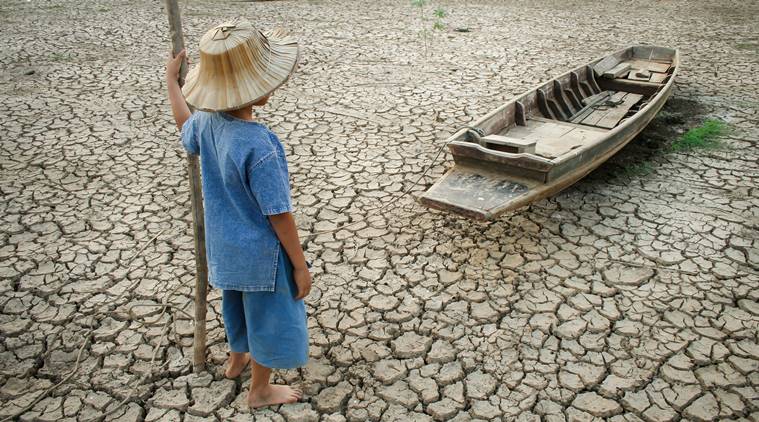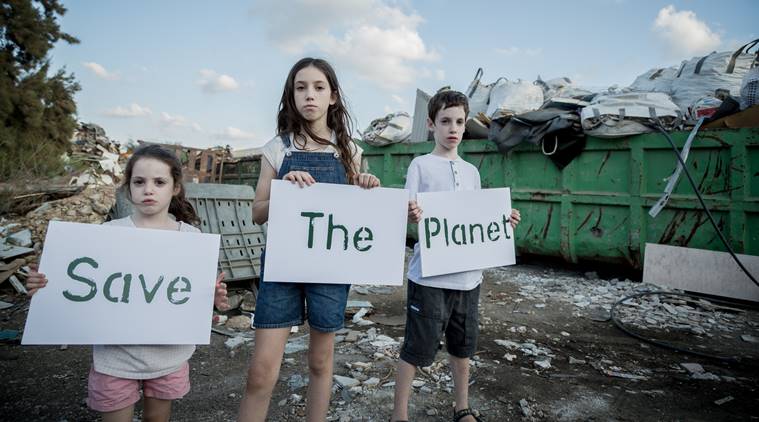
Our decades on this planet, mountains of learning and self-aggrandising posing has just made our world so much more toxic, so borrowing the young woman’s words, “How dare you?”

“Our ecosystems are collapsing and we are at the beginning of a mass extinction.” Sixteen-year-old Greta Thunberg has shaken us out of our comfortable carbon corners of complacency and made us sit up with global #ClimateStrike. Victor Hugo stated, “Nothing is as powerful as an idea whose time has come.” And nobody else could have brought this idea with such vehemence to the world but a kid. There have been attempts to speak up, but most of them lacked the black and white clarity of the message — “You have stolen my childhood with empty words.” Simple, but so true.
That is the thing about kids and the youth — they say it the way it is. They do not have vested interests of multi-billion industry to sway them. Nor are they stuck in trenches of sluggish habits to ask, “Why?” “Why not?”
To some of us who work with children and young people, these questions do not come as a surprise at all. What comes as a surprise, a nasty one, is when we hear adult voices dismissing them. But then I also realise that we adults do not want to hear that we are making wrong choices, especially from children even if they have irrefutable hard-core science and Sir David Attenborough backing them all the way. Especially the ones we see as being different or deficient. I have been perplexed by many people who have tried to mock Greta’s words as “alarmist,” “over the top,” “deeply disturbed,” having “mental health problems” or even “just a teenager with Asperger’s, with no life experience”! Seriously? Our decades on this planet, mountains of learning and self-aggrandising posing has just made our world so much more toxic, so borrowing the young woman’s words, “How dare you?”
The simple fact is that our children are active changemakers who can help us grow up and become a more aware, ecologically conscious and mindful society. If you think about it, children feel much more strongly about their world. It could be about protecting their environment, becoming sustainable, preserving our wild life or problems like poverty, corruption, communalism, terrorism — issues that we are struggling with as a human race. They question, they challenge, they dig us out of our lethargic stupor that we have let ourselves slip into. Their inborn sense of justice, fairness and forthrightness makes them right and natural agents for change. Actually, it is their zeal bordering on obsessiveness for what they feel strongly about that is an essential ingredient for raising our village.
Our children have helped my husband and I become more socially and environmentally responsible human beings. It could be about saving water, refusal to use plastic, taking care of stray puppies and dogs, picking up litter (even when on holiday), being more sensitive and supporting people from marginalised sections of our society, they have definitely helped to raise our little village. Discussions on mental health, preferred gender expressions, sexual orientations, feminism, racism, sex, #MeToo, our culture’s preoccupation with certain body type, privilege and power have been our dinner companions at home and our dialogue with young people at work. Our taboos have not been their taboos as they have slowly demolished our years of encrusted preconceptions.

I have heard many powerful voices criticise Greta’s parents for “allowing” her to miss school to carry out these protests. Do they seriously think that going to school is more important than what she is doing or that she would learn more from classwork than what she has done by missing it? Would going to school made her this active changemaker who has the power to change the world?
In fact, schools across the globe should be encouraging this process of learning. William Deresiewicz, literary critic, talked about how the goal of education should always be “to leverage learning as an agent of social change — the kind of objective that makes leadership and citizenship into something more than pretty words.”
Think! Children who start school this year – 2019 will be ready to start work in another twenty-five years’ time (on the average) which will be 2044. What do we know about what the world would be like at that time, whether it would be suitable for life or not and what jobs would be available for humans and which ones one would be taken over by robots? Not much. Therefore, one thing we can let our children do is question, connect dots and constantly challenge the taken for granted ways of living. As Greta reminded us, “No one is too small to make a difference.”
Let’s stop acting as if young people are just the passive recipient of our learning and knowledge. As if we know how life works and we have got it all figured out because we clearly do not. Ask them questions and listen carefully to what they are telling us. They will be telling you a lot of inconvenient truths and it will be uncomfortable but hear them out. So rather than asking our children, “What do you want to do when you grow up?” we need to be asking them, “What do you want to do now?”
- “What are the changes you want to see in your world that will make it a better world to live in?”
- “What are the steps you can take towards it?”
- “What are the steps your schools needs to take?”
- “What are the steps your family needs to take?”
- “How can we spread this story of change so that more and more people can be part of it?”
To the youth, I am sure you know that the adults cannot fix this world for you no matter how much they tried. You will have to take a lead on this one. You are right in saying that “We should not be the ones fighting for the future,” but only you can raise your voices loud and clear. Greta spoke for a lot of you when she said, “We are a wave of change, together and united, we are unstoppable.”Some of us adults, who understand the gravity of the situation, will stand right behind you. So please stand together, be the change and never ever stop. You are our hope.
Source: Read Full Article